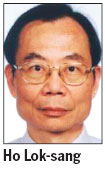Census observes new life in earnings mobility of Hong Kong
Updated: 2013-04-30 06:52
By Ho Lok-sang(HK Edition)
|
|||||||

The latest census brought good news for earnings mobility in Hong Kong. My colleagues and I just completed a study that shows new life in earnings mobility. However, the good news is restricted to degree holders. For those without degrees, only 6.6 percent will achieve twice the median income in Hong Kong, as compared to 52.6 percent for degree holders.
Among people born between 1976 and 1980, in the last by-census year (2006), only 24.5 percent of degree holders achieved twice the median income or more. The jump in this "accomplished rate" (so-called for convenience only) in five years to 52.6 percent does indicate a gigantic leap. The improvement for non-degree holders has been far less impressive, only from 4.2 percent to 6.6 percent.
Moreover, those born during 1976-80, aged 31-35 and not holding a degree are worse off than all the earlier cohorts. By contrast, for those holding a university degree there is a higher percentage among those born in 1976-80 who are "accomplished" than those born in 1971-75 at this age range. For non-degree holders, the striking pattern about the accomplished rate is that for any age group, the accomplished rate keeps falling from cohort to cohort.
While it is true that degree holders as well as non-degree holders are more likely to start their careers at less than half of the median income (impoverished) than the recent earlier cohorts, less than 2 percent of degree holders remain impoverished after age 25. In contrast, 8 percent to 13 percent of non-degree holders remain impoverished throughout the rest of their careers.
Historically, those born between 1966 and 1970 seem to have fared best among the groups we have examined. By the age of 41-45, 75 percent of its members earned at least twice the median wage. Those born between 1971 and 1975 were worse off than the previous group when they reached 31-35, which is what the last by-census showed us.
However, the latest census in 2011 showed that they caught up and overtook the previous group, with an accomplished rate of 67.6 percent, higher than the 64.3 percent of the previous group at this age. It is not known if this will continue to rise and if it will surpass the 75 percent rate of the previous group at age 41-45.
A good question to ask is why the latest census shows a reversal in the pattern of declining earnings mobility that appeared prevalent just five years ago. The clue probably can be found in the aging of the postwar baby boomers. This group is big and has been retiring in the past five years. As they retire they vacate their positions, allowing opportunities for those ready to be promoted. Unfortunately for the non-degree holders, such expansion of opportunities has largely eluded them. If this hypothesis is correct, the tendency is likely to last another decade or so, reviving optimism and perhaps bringing a fresh bout of demand for better quality housing.
The advantage of degree holders over non-degree holders is really quite surprising. Less than 3 percent of those in the sample were degree holders when they entered the labor force for the group born in 1961-65. This steadily increased to 32 percent for the latest group studied - those born in 1986-90. It should be expected that the advantage of degree holders will be greatly eroded, and that indeed is the prevalent perception. This is true to an extent. The accomplished rate for degree holders was about 14 times more than that of non-degree holders at age 21-25 for those born in 1961-1965. This kept falling to reach 3.6 times for those born in 1981-1985. But this multiple jumped to 11 times for those born in 1986-90. Moreover, by 31-35, as mentioned above, the accomplished rate rose to over 50 percent for degree holders, as compared with only 6.6 percent for non-degree holders, and this was for the 1976-80 cohort.
This may sound paradoxical. But more and more degree holders indeed begin their careers living off a meager income merely half the median wage - indeed over 11 percent of members of the latest group on our radar, those born in 1986-90. This compares with 4.25 percent for the group born in 1971-75. The impoverished rate for degree holders at age 21-25 had fallen to the lowest level among all groups in 1996, and had started rising rapidly since then. All this, however, does not diminish the fact that degree holders as a group fared far better than non-degree holders.
Is a university degree still a good investment? In terms of earnings, the evidence suggests so. But with another round of expansion in (private) university places on the horizon, the future is uncertain. With university education becoming available for the majority of students we need to tackle young people's expectations.
In particular, the non-degree track of career development needs to be given a boost, both morally and financially, while universities should offer an education that will turn students into stronger and healthier human beings - instead of merely paying lip service to "whole person development". We need to nurture a new generation of university graduates who can come to terms with more down-to-earth salaries while upholding a strong resolve to do the best they can to meet challenges.
The author is a director of the Center for Public Policy Studies at Lingnan University.
(HK Edition 04/30/2013 page1)